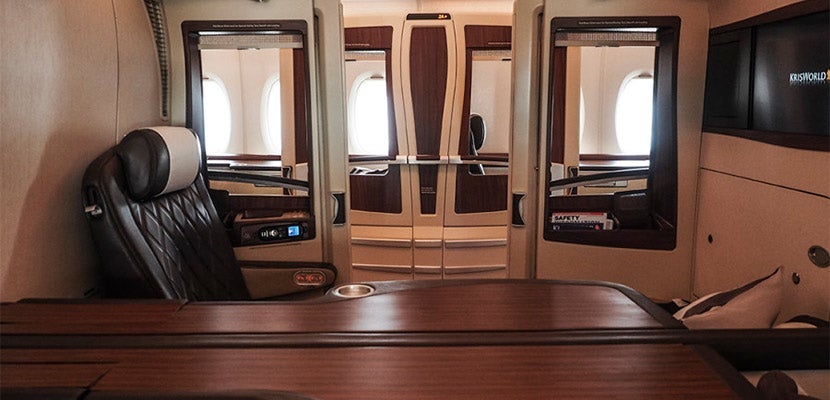My Credit Card Inventory: Which To Keep and Which to Cancel?
Update: Some offers mentioned below are no longer available. View the current offers here.
Around the start of each year, I take inventory of my portfolio of credit cards and weigh the benefits of each. That helps me weed out the ones that aren't providing enough value to offset their annual fees, and to decide which new ones I should apply for.
If you're new to the game there are plenty of lucrative sign-up bonuses to earn, like the 60,000-point bonus on the Ink Plus Business Card from Chase, and 50,000 Avios with the British Airways Visa Signature Card among others. I suspect we'll see even more great deals ahead, especially of the targeted variety, which usually pop up on the CardMatch tool. With that in mind, I need to make room in my wallet for any exciting new offers that do come up, and to do so, it's time to take stock of the cards I currently have and those that I'd like to apply for in 2016.
As I decide whether to keep, cancel or convert each card, here are the three factors that I consider:
- Are the benefits of each card worth more than the annual fee?
- Is there a duplicate or substitute card that can get me similar perks/benefits and a new sign-up bonus?
- How long have I had the card? Is it worth keeping open to preserve the history of the account?
Before you get started, take a look at these posts for advice on checking your credit score, applying for new cards and getting approved:
- 5 Things to Understand About Credit Before Applying for Cards
- Your FICO Score and Which Credit Cards Offer it for Free
- How to Use the CardMatch Tool to get Even Better Sign-Up Offers
My considerations might differ from yours, especially since I consistently spend a significant amount on my credit cards. I use my various credit cards for almost every single dollar of personal and business spending, as well as a lot from family and friends, so I can hit some high spending thresholds and earn some of the rarer credit-card perks out there. When evaluating your own needs and habits, estimate how much you spend annually on each credit card, and then decide which spending bonuses are worth your while and which cards best align to the categories where you spend the most. Here's my inventory:
| Card | Annual Fee* | Keep or Cancel? |
|---|---|---|
The Business Platinum Card from American Express OPEN | $450 | Keep |
Business Gold Rewards Card from American Express OPEN | $175 | Keep |
Premier Rewards Gold Card from American Express | $195 | Keep |
Starwood Preferred Guest® Credit Card from American Express | $95 | Keep |
Starwood Preferred Guest® Business Credit Card from American Express | $95 | Keep |
Alaska Airlines Visa Signature credit card | $75 | Cancel |
Virgin Atlantic World Elite MasterCard | $90 | Cancel |
Barclaycard Arrival Plus World Elite Mastercard | $89 | Keep |
AAdvantage Aviator Silver | $195 | Keep |
Visa Black Card | $495 | Cancel |
Capital One Venture Rewards Credit Card | $59 | Switch to Quicksilver |
Chase Ink Plus Business Card | $95 | Keep |
Chase Sapphire Preferred Card | $95 | Keep |
Chase Freedom
(No longer open to new applicants) | $0 | Keep |
British Airways Visa Signature Card | $95 | Keep |
United MileagePlus Explorer Card | $95 | Keep |
Hyatt Credit Card | $75 | Keep |
IHG Rewards Club Select Credit Card | $49 | Keep |
Ritz-Carlton Rewards Credit Card | $450 | Keep |
Citi Premier® Card | $95 | Keep |
Citi / AAdvantage Executive World Elite Mastercard | $450 | Keep |
Citi Hilton HHonors Reserve Card | $95 | Keep |
Club Carlson Premier Rewards Visa Signature Card | $75 | Keep |
*On-going annual fee
AMERICAN EXPRESS

Business Platinum

Annual fee: $450
My take: Though this card has one of the highest annual fees out there, benefits like the $200 annual airline rebate, lounge access, automatic Hilton Gold status and automatic Starwood Preferred Guest Gold status — not to mention the Fine Hotels & Resorts program, Global Entry or TSA PreCheck application fee credits and complimentary Boingo and Gogo in-flight Wi-Fi passes — are far more valuable than the cost of the annual fee. I also love getting access to the Centurion Lounges when I travel. Not only that, but the business version offers perks that the personal version does not, including those Gogo passes and a 50% redemption bonus on points you redeem directly for airfare through Amex travel. Check out my post on 9 Reasons I Love My Amex Business Platinum.
Verdict: Keep, but I'm tempted to get the personal The Platinum Card® from American Express so I can add three extra cardholders for a total of $175, which is an incredible deal since all three get lounge access, including Centurion lounges, and a TSA PreCheck/Global Entry rebate. However, for now I'm keeping my Business Platinum so I get the additional OPEN Savings and business-focused perks.
Business Gold Rewards Card
Annual fee: $175 (waived the first year)
My take: With this card, it's all about the points-earning potential since you can choose a spending category in which to earn 3 points per dollar, including: airfare; advertising in select media; purchases at gas stations, shipping; or computer hardware, software and cloud computing. Then you earn 2 points per dollar in the remaining four categories. Personally, I get 3 points per dollar on internet advertising, which is huge for me since I spend a lot on Facebook advertising for TPG, and I can pay with this card with no fee. I spend the $100,000 category maximum a year on internet advertising, earning me 300,000 Membership Rewards points (which I value at about $5,700). I'd receive just 100,000 points with another card like the Starwood Preferred Guest Amex (which I would value at about $2,500). That makes this card one of the most powerful weapons in my credit-card arsenal.
Verdict: Keep
American Express Premier Rewards Gold Card
Annual fee: $195 (waived the first year)
My take: Though this card has a pretty hefty annual fee, it also offers several great benefits that I think make keeping it worth it. The annual $100 airline fee rebate cuts that annual fee down to $95 in my mind, and earning 3 points per dollar on airfare is a great earning opportunity for me since I spend a lot on airline tickets. I also put a lot of my domestic gas and grocery purchases on it since I earn 2 points per dollar on them, and the card waives foreign transaction fees as well. Dining and non-airline travel spend all go on the Sapphire Preferred.
Verdict: Keep

Starwood Preferred Guest Credit Card from American Express
Annual fee: $95 (waived the first year)
My take: Though Amex raised the annual fee on this card this past year, it also added new benefits including waived foreign transaction fees, complimentary unlimited Boingo Wi-Fi and complimentary premium in-room internet access. You also earn 2 Starpoints per dollar spent on purchases at participating SPG hotels. The card also automatically gives cardholders credit for 2 stays/5 nights each year toward earning elite status, and if you spend $30,000 on it in a calendar year, you get automatic Gold status. Not only that, but Starwood points are among the most valuable points currencies out there. Amex's purchase protection is solid as well, so I put all my SPG stays on these cards and any big-ticket items that aren't in a bonus category for other cards, such as clothing purchases. For more, check out this post on One Year of Earning and Burning with the SPG Amex.
Verdict: Keep — the 2 stays/ 5 nights elite status benefit alone covers the annual fee, and I put all SPG stays on this card.
Starwood Preferred Guest Business Card
Annual fee: $95 (waived the first year)
My take: I like this card for all the same reasons I like the personal version, and it even comes with additional benefits such as OPEN Savings discounts and Sheraton Club access. Plus, just having it gets me another 2 stays/5 nights of credit toward elite status this year — well worth the $95 annual fee.
Verdict: Keep
BANK OF AMERICA

Alaska Airlines Visa Signature card
Annual fee: $75
My take: Thanks to some great airline partners and redemption values, Alaska miles are super valuable. The card also offers a yearly companion certificate that allows you to bring a friend or family member on a paid trip for just $99 (plus taxes and fees), which can equate to several hundreds of dollars in savings. I already have the sign-up bonus, though, and I find it easier to transfer points from SPG, so I'm going to cancel this card. If you're interested in signing up yourself, out this post on One Year of Earning and Burning with the Alaska Airlines Visa.
Verdict: Cancel
Virgin Atlantic World Elite MasterCard
Annual fee: $90
My take: It might surprise you to learn that I still have this card considering you can transfer points to Virgin from Amex Membership Rewards, Chase Ultimate Rewards, Citi ThankYou Rewards and Starwood Preferred Guest. However, one of the reasons that I've kept it is that ever cardmembership year that I spend $25,000 on it, I get 15,000 bonus miles, and I earn 1.5x miles per dollar on everyday purchases. While that's been useful for redeeming for Virgin Atlantic Upper Class in the past, with all the transfer options out there now to top up my account, this card's benefits just don't seem worth it to me anymore. I also have a ton of Delta SkyMiles which are better for redeeming Virgin Atlantic flights (62,500 miles one-way for US to Europe business class).
Verdict: Cancel
BARCLAYCARD
Arrival Plus World Elite Mastercard
Annual fee: $89 (waived the first year)
My take: I like having a card that can cover the in-between costs of travel — from Uber to bed and breakfasts to even private jets. Plus, 2.11% on travel redemptions is better than the cash back I could get on cards like the Citi Double Cash. Even though I'm not crazy about the recent changes to this card and its benefits — such as raising the minimum point redemption from 5,000 to 10,000 and the elimination of the tourist attraction category — I keep this card to diversify my points.
AAdvantage Aviator Silver
Annual fee: $195
My take: When US Airways merged with American, Barclaycard changed its US Airways MasterCard cardholders over to various versions of these Aviator cards. I got the highest-tier one, the Silver. Thought its annual fee is rather high at $195, it comes with a $100 Global Entry application fee waiver, and earns 3 miles per dollar on American flights and 2 miles per dollar on hotels and car rentals. Not only that, but you can earn 5,000 elite-qualifying miles for each $20,000 in annual purchases up to 10,000 miles maximum each year. You also get a 10% mileage rebate up to 10,000 miles per calendar year on award redemptions and a companion certificate each year good for up to two guests at $99 each with $30,000 in purchases each cardmember year. It doesn't charge foreign transaction fees, and comes with World Elite MasterCard perks as well.
Verdict: Keep
Visa Black Card
Annual fee: $495
My take: Though the annual fee on this card is comparable to other products like the Platinum Card from Amex and the Citi Prestige, it just doesn't offer comparable benefits. I initially got this card for the 25,000-point sign-up bonus (worth $500 in airfare), and I wanted to test it out, so it paid for itself the first year. That said, I earn just 1 point per dollar on all purchases, and the program doesn't offer access to as many nice lounges as the two other premium cards mentioned above. The return on spending just isn't high enough to justify the annual fee going forward.
Verdict: Cancel/ potentially change to one of their new line of products coming out this quarter.
CAPITAL ONE

Venture Rewards Credit Card
Annual fee: $59 (waived the first year)
My take: The Barclaycard Arrival Plus gives a better return for travel expenses (at 2.1% back), while the Capital One Venture is a better option for people who want to pay a lower annual fee or use points in smaller increments. The Arrival Plus better fits my needs.
Verdict: Switch to no-annual-fee Capital One Quicksilver Card to get 20% off on Uber.
CHASE

Ink Plus Business Card
Annual fee: $95
My take: Among the benefits of this card I value are the waived foreign transaction fees; the ability to transfer points to 10 travel partners including British Airways, United and Hyatt; and its tremendous earning capability. With it, I get 5 points per dollar at office supply stores; and on cell phone, landline, internet and cable TV services (on up to $50,000 in spending annually), and 2 points per dollar spent at gas stations and on hotel accommodations (again, on up to $50,000 in spending annually).
Verdict: Keep
Chase Sapphire Preferred
Annual fee: $95 (waived the first year)
My take: The Sapphire Preferred has been one of my all-around top travel credit cards. It's the card I use for most of my purchases thanks to the ability to earn 2 points per dollar on restaurant and travel purchases with no limit. That represents a tremendous earning opportunity since pretty much all I do is travel and dine! That, plus benefits like primary car rental insurance and waived foreign transaction fees, earns it a permanent place in my wallet. Check out this post on 5 Reasons Chase Sapphire Preferred Should Be Your First Card in 2016 and this one on One Year of Earning and Burning with the Chase Sapphire Preferred.
Verdict: Keep
Chase Freedom
Annual fee: $0
My take: The Freedom card is among the top cash-back credit cards out there thanks to no annual fee and rotating categories in which you can earn 5 points per dollar on up to $1,500 in purchases each quarter. Because I also have the Sapphire Preferred and Ink Plus, I can also combine the points I earn with my Freedom with those from my other two cards and transfer them to Ultimate Rewards' 10 travel partners.
Verdict: Keep
British Airways Visa Signature Card
Annual fee: $95
My take: Despite some major Avios program devaluations, I still think this card is worth keeping for a few reasons. It earns 3 Avios for every dollar spent on British Airways purchases and 1 for every dollar spent on all other purchases. Cardholders also get 10% off British Airways ticket purchases with the CARDOFFERU cardholder code through the end of 2016, which pretty much pays for that annual fee itself (though you may be able to use that code with other Visa cards as well). Perhaps most valuable, every calendar year that I make $30,000 in purchases on the British Airways Visa card, I'll earn a Travel Together Ticket good for the rest of the year and the following, which can be worth thousands of dollars if I redeem for business or first class.
Verdict: Keep

United MileagePlus Explorer Card
Annual fee: $95
My take: I can earn 10,000 bonus award miles each calendar year I spend at least $25,000 on this card, which brings the potential earning rate to 1.4 miles per dollar on everyday purchases. This card also gives cardholders access to expanded award availability, which can open up a lot of travel possibilities, even at the higher standard level. If you don't have United elite status, this card's airline-specific perks like free checked bags and priority boarding can also be worth it. And if you do hope to earn United elite status but the spending requirements are an issue, note that they're waived for Silver, Gold and Platinum Premiers who spend $25,000 on this card in a calendar year (though not 1Ks).
Verdict: Keep
Hyatt Credit Card
Annual fee: $75
My take: This card has a couple of great benefits in its favor. First, the current sign-up bonus gets you two free nights after you spend $2,000 in the first three months. Plus, it earns 3 points per dollar on Hyatt purchases and 2 points per dollar on restaurants, car rentals and airfare purchases. It also offers automatic Discoverist status and a free night at a Category 1-4 property (which can be worth well more than the annual fee) on each cardmembership year anniversary. Though normally I'd rather earn Ultimate Rewards points, which I can then transfer to Hyatt at a 1:1 ratio, I might actually put more spending on the card this coming year.
Verdict: Keep

IHG Rewards Club Select Credit Card
Annual fee: $49 (waived the first year)
My take: This card comes with several benefits that make its low annual fee well worth it. First, it confers automatic Platinum elite status on cardholders, and a 10% rebate on points redemptions, as well as an annual free night upon renewal. Though it earns 5 points per dollar on IHG purchases and 2 points per dollar at gas stations, restaurants and grocery stores, I actually don't spend too much on it, but keep it for the other benefits instead.
Verdict: Keep
Ritz-Carlton Rewards Credit Card
Annual fee: $450
My take: This is one of the top premium travel credit cards out there thanks to benefits like an annual $300 travel credit, a $100 hotel credit on paid stays of two nights or more, automatic Gold Elite status for your first year and subsequent years when you spend $10,000 or more, Lounge Club membership and Club Level upgrades. For me personally, this card is a no-brainer because I'm staying at more Ritz-Carlton properties lately, and have an upcoming trip planned to the Ritz-Carlton Grand Cayman Cookout (stay tuned for trip reports). The upgrade and status benefits alone are worth the annual fee for me, and that $300 travel credit is a great deal-sweetener as well. For more information, see this post on the Ritz-Carlton Rewards Card: Should it be in Your Wallet?
Verdict: Keep
CITI

Citi Premier® Card
Annual fee: $95 (waived the first year)
My take: There are many reasons to keep this card, in my opinion. The annual fee is relatively low compared to the benefits, which include bonus spending categories where you can earn 3 points per dollar on a wide range of travel purchases and 2 points per dollar on dining and entertainment. ThankYou Rewards has also improved dramatically over the past year, adding more than a dozen transfer partners. The points game is all about diversification, so having such a strong transfer program has really upped ThankYou Rewards' significance in my book. I use this card for entertainment such as movies and amusement parks, and travel expenses that the Sapphire Preferred's 2x bonus does not cover. Though I'll keep this card for now, I'm also considering applying for the Citi Prestige instead thanks to its amazing benefits package. Check out this post on One Year of Earning and Burning with the Citi Premier.
Verdict: Keep for now, maybe convert to Citi Prestige
Citi / AAdvantage Executive World Elite Mastercard
Annual fee: $450
My take: The main benefits of this card that I value are Admirals Club access (worth about $350 to me alone), which the card recently extended to authorized users (of which you can add up to 10 per card account for free). It also offers a credit for Global Entry or TSA PreCheck application, which equals another $100 in value. It also lets me earn 2 miles per dollar spent on eligible American Airlines purchases. However, the other major benefit I derive is the ability to earn 10,000 elite-qualifying miles for spending $40,000 on the card each calendar year. That's 10% of the way toward maintaining my Executive Platinum status, just through spending alone. Check out this post on Whether to get the Citi / AAdvantage Executive Card.
Verdict: Keep — however, while AA confirmed that it has no plans to limit the EQM earning to only one co-branded card (though you are limited to one per bank), if that does eventually happen I'll cancel the Executive AAdvantage, keep the Aviator Silver and get the Citi Prestige for AA lounge access and other perks.

Citi Hilton HHonors Reserve Card
Annual fee: $95
My take: This card offers a ton of great benefits, including the ability to earn 10 HHonors points for every dollar spent on hotel stays within the Hilton Worldwide portfolio, 5 points for every dollar spent on airline and car rental purchases and 3 points for every dollar spent on all other purchases. It also comes with automatic Hilton HHonors Gold status, and lets me earn Diamond status with $40,000 in annual spending. However, I don't stay at Hiltons very often; my Business Platinum card gets me automatic Gold status already; and I value top-tier status with Hyatt, Ritz-Carlton and Starwood much more than Hilton Diamond. The one major reason I keep this card is that it gets me a free weekend night certificate on the account anniversary, which can far outweigh that annual fee. For more information, check out this post on the card.
Verdict: Keep

US BANK
Club Carlson Premier Rewards Visa Signature Card
Annual fee: $75
My take: Though Carlson isn't my main hotel program and has made some recent negative changes both to its awards and its card benefits, I like this card thanks to some great benefits like earning 10 points per dollar on Carlson stays and 5 points per dollar on everyday purchases. Cardholders also get an automatic 40,000-point renewal bonus each year (which more than makes up for that annual fee) along with the ability to earn one free night at US properties when they spend $10,000 on purchases each cardmember year upon renewal, automatic Gold Elite Status or credit for 15 qualifying nights toward reaching a higher status.
Verdict: Keep
BOTTOM LINE
While I'm making a few cuts when it comes to my credit card stash this year, the vast majority will retain a place in my wallet. Thanks to a variety of cards and benefits — such as airport lounge access, free hotel nights and complimentary elite status — I'm getting enough value from 19 of 23 to continue using them and paying the applicable annual fees.
That said, four of my current inventory didn't make the cut due to redundant benefits or perks that simply weren't worth the annual fees. With a few cancellations on the horizons, I'm going to get several new cards — stay tuned for which ones I choose and why!
Are you planning on canceling or applying for any credit cards this year? Feel free to share your plans in the comments below!
